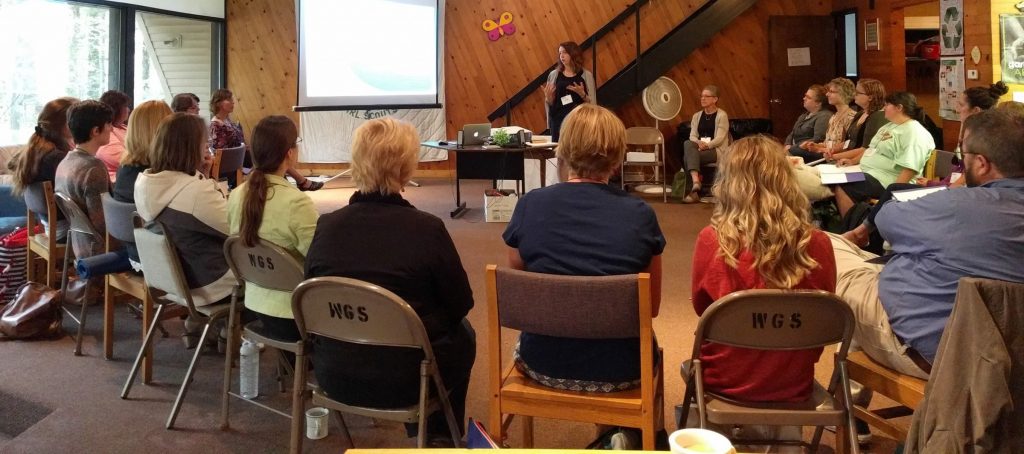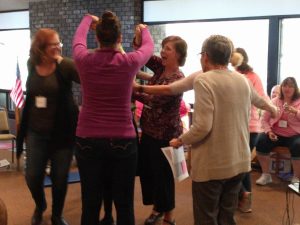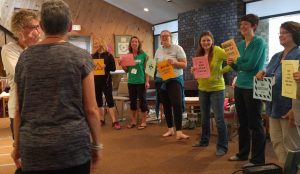The evidence-based Strengthening Families Program: For Parents and Youth 10-14 (SFP 10-14) is a cost-effective substance use prevention and skills building program that brings parents and their youth ages 10-14 together in highly interactive sessions that improve parenting skills, build life skills in youth, and strengthen family bonds.
In a series of research studies, the Mindfulness-enhanced Strengthening Families Program: For Parents and Youth 10-14 (MSFP 10-14) was created by Larissa Duncan, UW-Madison, Associate Professor, and UW-Extension, Healthy Minds, Children, and Families Specialist and colleagues at Penn State University, including Elaine Berrena, Penn State, Research Technologist (SFP 10-14 Master Trainer and MSFP 10-14 Master Trainer), and Rob Nix, who is now also a UW-Extension integrated specialist. In September, Elaine and Larissa facilitated a pilot MSFP 10-14 train-the-trainer workshop for 23 professionals representing UW-Extension educators and representatives from community-based organizations from four Wisconsin counties (Jackson, Marquette, Adams, and Langlade). This is the first step in bringing the mindfulness-enhanced version to Wisconsin statewide.
 This first Wisconsin train-the-trainer in Wisconsin Rapids consisted of four days of immersion in the MSFP 10-14 curriculum with mindfulness and mindful parenting skills training seamlessly incorporated into the SFP 10-14 standardized curriculum. The training provided opportunities for participants to reflect on learning and practice facilitation skills.
This first Wisconsin train-the-trainer in Wisconsin Rapids consisted of four days of immersion in the MSFP 10-14 curriculum with mindfulness and mindful parenting skills training seamlessly incorporated into the SFP 10-14 standardized curriculum. The training provided opportunities for participants to reflect on learning and practice facilitation skills.
For some attendees everything about MSFP 10-14 was new, but others came specifically with the desire to blend two passions together. When asked about their previous experience with contemplative, mindfulness meditation, or yoga practices many articulated the importance of their personal practice in their life and work.
“My yoga and mindfulness practice has transformed my life–my physical and emotional health, my relationships, and my ability to balance life and work…”
“It has been life-changing for me to learn how to explore my own experiences through mindfulness and meditation. Sharing that experience with intentionality, non-judgment, and presence has deepened my own experience and I’ve felt great satisfaction in sharing and encouraging others (youth and adults) to learn about the benefits of contemplative practices.”
 Although much of the time was spent listening, learning, contemplating, and reflecting, equal effort went into actively participating in many of the components of SFP 10-14. Here (left image), a small group tests out the fun quotient playing the Knot Game.
Although much of the time was spent listening, learning, contemplating, and reflecting, equal effort went into actively participating in many of the components of SFP 10-14. Here (left image), a small group tests out the fun quotient playing the Knot Game.
A couple days later they were ready to practice handling peer pressure by following the 6 steps: Stop and Take a Breath, Ask Questions, Name the Problem, Tell What Could Happen, Suggest Another Route. Guess which step is new in MSFP 10-14!
At the end of each module, as appropriate, the trainees practiced the three mottos of the program: one each for parents, youth, and families. They would likely agree that the “family” motto applied to the strong team training environment as they said goodbye on Friday, “We are strong families [educators] who listen to each other, care about each other, and have fun together.”
Two months after the program, a survey of attendees revealed that the training was excellent in content, as well as the instructors’ preparation, enthusiasm, and focus. Overall, the attendees appreciated the instructors’ knowledge, passion, and the addition of the mindfulness components in the MSFP 10-14 version of the curriculum. Everyone who responded to the survey feels they are either moderately or very prepared to teach the program, with some needing further support to develop the prerequisite personal mindfulness or contemplative practice.
Those who have been trained are looking forward to on-going support from UW-Extension with this vital community program. One attendee added the final comment: “We need to let every family with kids have a chance to go through MSFP!”
Larissa Duncan is now working with the UW-Madison Institute for Clinical and Translational Research (ICTR) on a grant proposal that would both fund broader expansion through Cooperative Extension in Wisconsin and help answer key questions about how to best disseminate MSFP 10-14 and deliver it with fidelity. As we face the opioid epidemic, the time is right to boost our prevention efforts!
(For information on curriculum and logistics contact Libby Bestul, UW-Madison and UW-Extension, Outreach Specialist. lbestul@wisc.edu or 608-262-2611)